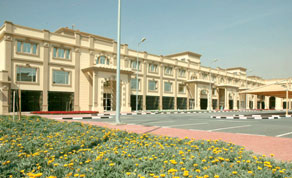 |
| Shuttered store fronts are the most common feature at Barwa Village |
A survey of stores at Barwa Village conducted by Gulf Times has revealed that the vast majority of them are operating at a loss due to a lack of customers and “excessively high” rents, resulting in mostly shuttered storefronts.
Inadequate access to the shopping complex by road, and poor connections by bus have brought very few customers, leaving stores struggling to even pay their employees’ salaries let alone the QR10,700 monthly rent for a single shutter.
At least two stores are reported to have closed this Friday alone, following several others in recent weeks.
One computer supplies store owner, attracted by the prospect of a bustling market with a diversity of stores, moved his retail outlet to Barwa Village to find an almost total absence of walk-in business. “How can we make a profit? If there is a customer, we have a sale,” said one salesman. “If they do something to bring customers, we can continue, otherwise, no.”
He says he has already seen six neighbouring stores close their shutters permanently, and is unsure of his future prospects.
It is easy to understand why so few customers come to the complex as it is not particularly close to either Wakrah or Doha, and the buses that stop in the Village only connect those two destinations.
Those coming from Wakrah must drive an additional 4km to reach it as there is no junction or exit from the highway that is convenient for the Village. Customers wishing to return to Doha must first drive 6km towards Wakrah before being able to head home.
Things may improve after a signal which has been sanctioned on the Wakrah road near the entrance to the complex is completed in the near future.
A number of vendors have called for a bus station to be set up nearby to attract customers from across the country, as a replacement for the services which used to run into the city centre’s souq district.
Another problem, some store operators say, is that there are no residential areas nearby for bachelors. Only families are allowed to live in Barwa Village, and as more than one salesman pointed out, they have cars, making them more likely to go to hypermarkets or other shopping malls.
A clerk at a supermarket in Barwa Village said that he no longer fully stocks his shelves because when he did it was a “total loss.”
He struggles to compete with major supermarkets that provide a wide selection of products in one store, but would have an advantage in a neighbourhood with a large bachelor population that does not have a lot of personal transport.
Some stores have tried to use special promotions to attract customers, with one shoe store offering QR25 cash back for every QR100 spent.
A computer supply and repair shop, which relies heavily on pre-existing clientele to remain in business, has had to put together computer packages at reduced prices in order to attract sales. Unfortunately, they have had no walk-in customers and so their special promotion has gone unnoticed. With monthly expenses of around QR25,000, their income of 3,000 is simply not sufficient.
In a Monty Pythonesque twist, the most striking example of a missed opportunity at Barwa Village is a pet shop with no pets. Due to a prohibition on animals imposed by the shopping complex’s management, Pets and More can only sell pet supplies. “If Barwa allows pets, I think it will boom,” said John, a clerk at the store, as many customers are not surprisingly demanding pets from a pet store. If this rule were to change, Pets and More could be one of the few outlets in the complex turning a profit.
Many stores are relying on other branches and outlets around Qatar to cover their losses, while some are having their rents paid out of the owner’s pocket, which in a few cases threatens the salaries of employees.
A partner at Sharjah Moonway Trading said he basically has no customers at all, and covers his expenses through his wholesaling business. Clearly frustrated, he could not understand why rents were so high at a shopping complex where most of the storefronts were closed, and said that he will likely be taking his business elsewhere in the near future. High rents for successful businesses would make sense, he thought, whereas the opposite seems to have guaranteed failure.

